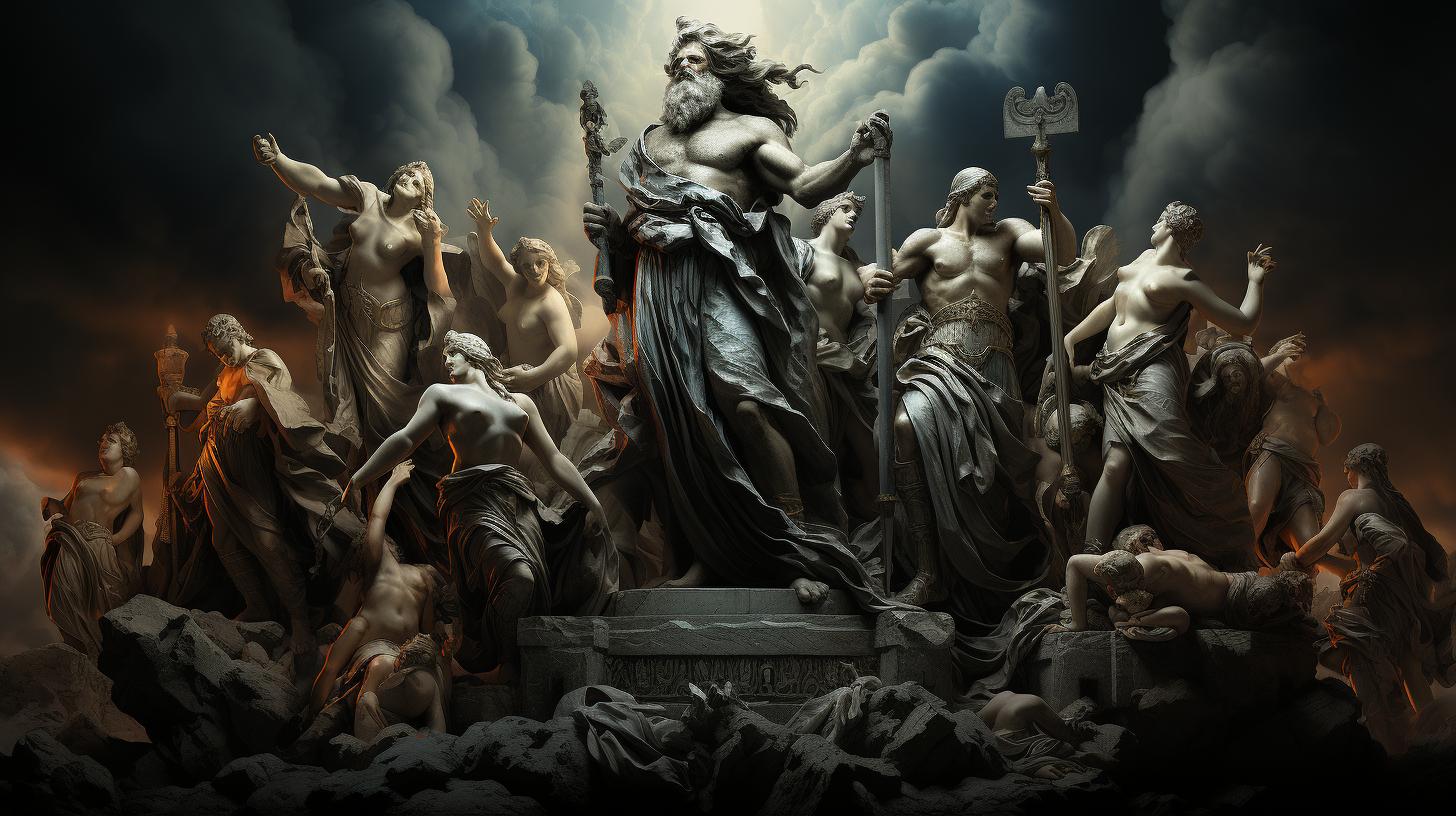Helen of Troy: A Mythological Tale of Beauty and Betrayal

Helen of Troy, a prominent figure in Greek mythology, was known as the most beautiful woman in the world. She was the daughter of Zeus and Leda, the queen of Sparta.
Helen’s captivating beauty sparked the infamous Trojan War, as she was abducted by Paris, the prince of Troy. This article explores the myth and legend surrounding Helen of Troy, the events of the Trojan War, and the lasting legacy of this iconic figure.
Join us as we delve into the captivating world of Helen of Troy and her role in Greek mythology.
Helen of Troy: The Woman with the Face that Launched a Thousand Ships
Embark on a journey into the captivating world of Helen of Troy, a legendary figure in Greek mythology.
Her enchanting beauty has been the subject of tales and songs for centuries. In this section, we will explore the myth and legend surrounding Helen, delving into her divine origins, her unconventional marriage, and the events that led to the infamous Trojan War.
The Myth and Legend of Helen of Troy
Helen of Troy, often referred to as the face that launched a thousand ships, was renowned for her unparalleled beauty. According to ancient Greek mythology, her captivating allure was said to have the power to captivate the hearts of men.
The Divine Origins of Helen: Daughter of Zeus and Leda
Helen’s origins were nothing short of divine. Born to Leda, the queen of Sparta, and Zeus himself, who had taken the form of a majestic swan, she was destined for greatness.
This divine lineage bestowed upon Helen a radiance that surpassed that of mortal women.
Helen’s Unconventional Marriage: Menelaus, the Chosen Husband
Helen’s marriage to Menelaus, the powerful king of Sparta, was not one of love or choice but rather a union arranged by her father, Tíndaro. Menelaus’ position of power and his potential to inherit a kingdom made him the suitable match for Helen, regardless of her own desires.
The Trojan War Begins: The Apple of Discord and the Judgment of Paris
The beginnings of the Trojan War can be traced back to a devious act orchestrated by Eris, the goddess of discord. She threw a golden apple into a banquet meant for the gods, declaring it to be for the fairest of them all.
This sparked a competition between Hera, Athena, and Aphrodite, each vying for the title.
Zeus appointed Paris, the prince of Troy, as the judge. In an effort to sway Paris’ decision, each goddess promised him a reward.
It was Aphrodite’s alluring promise of Helen’s hand in marriage, the epitome of beauty, that ultimately won the apple and ignited a chain of events that led to the fateful Trojan War.
The Epic Trojan War: Myth or Reality?
The Trojan War is a tale that has captivated the imaginations of scholars, historians, and storytellers for centuries. This section explores the ongoing debate surrounding the veracity of the Trojan War and its status as either a historical event or a legendary myth.
Unraveling the Trojan War: Fact or Fiction?
Unraveling the truth behind the Trojan War has proven to be a complex task. Some argue that the war was entirely fictional, a concoction of ancient poets and bards. Others contend that it had a basis in historical events, albeit embellished over time.
Scholars tirelessly sift through ancient texts, archaeological findings, and historical sources in an attempt to piece together the puzzle.
Historical Context: Troy and the Greek City-States
To understand the Trojan War, one must delve into the historical context of ancient Troy and the Greek city-states. Troy, located in modern-day Turkey, was a prosperous and strategically important city.
The Greek city-states, such as Sparta, Athens, and Mycenae, held a deep-rooted rivalry with Troy, leading to the eventual conflict.
The Role of Helen in the Trojan War
Arguably the central figure in the Trojan War, Helen’s involvement in the conflict is a subject of much debate. According to the myth, her elopement with Prince Paris of Troy sparked the war.
However, some scholars speculate that Helen may have been a metaphorical representation of the tension between Greece and Troy, rather than a historical figure in her own right.
The Ten-Year Siege: Epic Heroes and Tragic Losses
The Trojan War was a protracted and bloody conflict that lasted for a decade.
It saw the rise of epic heroes such as Achilles, Hector, and Odysseus, whose tales of bravery and tragedy resonated throughout the ages. The war was marked by fierce battles, cunning strategies, and devastating losses on both sides, leaving an indelible mark on Greek mythology and history.
The Tale of Love and Betrayal: Helen and Paris
Love at First Sight: Helen and Paris’ Fateful Encounter
It all began with a chance meeting, a moment that would change the course of history forever. Helen, the epitome of beauty, crossed paths with Paris, the prince of Troy, and their eyes locked in a mesmerizing gaze.
Love ignited within their hearts, setting in motion a series of events that would lead to both passion and devastation.
The Seduction and Abduction of Helen
Unable to resist the allure of Helen’s radiance, Paris took bold action to make her his own. Breaking the bonds of morality and duty, he seduced and eloped with Helen, whisking her away from her loyal husband, Menelaus.
The audacity of their affair sent shockwaves through the ancient world, foreshadowing the tragic fate that awaited them all.
The Consequences of Helen’s Choice: Sparking the Trojan War
Helen’s decision to abandon Menelaus and follow her heart ignited the flames of war. Greece rallied behind Menelaus and his brother, Agamemnon, seeking revenge for the stolen queen. The combined might of the Greek city-states amassed, preparing to lay siege to the walled city of Troy.
The Trojan War had begun, a decade-long conflict fueled by love, betrayal, and a quest for power.
The Aftermath of the War: Helen’s Return and Fate
After ten grueling years of bloodshed and loss, the Greeks finally prevailed. Troy fell, its once-glorious walls reduced to rubble. Helen, now a pawn in the games of men, was returned to her rightful husband, Menelaus.
Her fate in the aftermath of the war remains shrouded in mystery and controversy. Some accounts claim she lived in peace with Menelaus until their deaths, while others paint a darker tale of her capture and hanging as revenge for the fallen Trojan king, Tlepolemus.
Alternatively, some legends speak of her and Paris being taken to Egypt, where Helen was held captive while Paris met his end on the battlefield.
In the wake of the war, Helen’s story reverberated throughout the ancient world, leaving a lasting impact on art, literature, and religious practices.
Her undeniable beauty inspired countless artists, while her complex portrayal in myths sparked debates on morality and loyalty. Helen’s legacy persists as she is revered as Dendritis, the goddess of trees, and a patron deity of sailors.
- The irresistible attraction between Helen and Paris led to their fateful encounter, forever changing their lives.
- Paris’s audacious act of seduction and abduction marked the beginning of a tragic saga.
- Helen’s choice to follow her heart sparked a decade-long war that left a lasting impact on civilizations.
- Following the war, Helen’s ultimate fate remains shrouded in mystery, with conflicting accounts of her life and demise.
Explore the intertwined tales of love, betrayal, and the complicated legacy of Helen and Paris in Greek mythology.
The Influential Goddesses: Hera, Athena, and Aphrodite
The myth of Helen of Troy wouldn’t be complete without the intervention of three powerful goddesses: Hera, Athena, and Aphrodite. These divine figures played a crucial role in the events leading up to the Trojan War.
The Golden Apple: The Catalyst for Divine Rivalry
It all started with a golden apple inscribed with the words “For the fairest” that Eris, the goddess of discord, threw into the midst of a divine banquet. This simple act sparked a fierce rivalry among Hera, Athena, and Aphrodite, each vying for the title of the most beautiful goddess.
The golden apple became a symbol of divine rivalry and set the stage for the role these three goddesses would play in the story of Helen of Troy.
Hera, Athena, and Aphrodite’s Bargain with Paris
In their quest to win the golden apple, Hera, Athena, and Aphrodite sought the assistance of Paris, the prince of Troy.
Each goddess offered him a tempting bribe. Hera promised him power and wealth, Athena offered him wisdom and skill in battle, while Aphrodite enticed him with the love of the most beautiful mortal woman in the world – Helen of Troy.
In the end, Paris chose Aphrodite’s promise, thus sealing the tragic fate of Helen.
Aphrodite’s Promise: Helen as the Ultimate Prize
Helen, the woman whose beauty had captivated the hearts of men, became the ultimate prize in the rivalry between the goddesses. As promised by Aphrodite, Paris set out to claim Helen as his own.
Their passion ignited a series of events that led to the Trojan War, as Helen abandoned her husband Menelaus, the king of Sparta, for the love of Paris. Aphrodite’s promise proved to be a catalyst for betrayal and would shape the destiny of Helen and the world around her.
The Legacy of Helen: Beauty, Tragedy, and Worship
The story of Helen of Troy transcends her time, leaving an indelible mark on history and mythology. Her fabled beauty continues to inspire art, literature, and admiration. The accounts of her fate after the war diverge, creating a sense of mystery and intrigue.
Moreover, Helen’s revered status in different cults and festivals in Greece showcases her enduring significance. Let us explore the enchanting legacy of this iconic figure.
Helen’s Enduring Beauty: An Inspiration for Art and Literature
Renowned for her unparalleled beauty, Helen captivated the hearts of all who beheld her.
Artists across centuries and cultures sought to capture her ethereal charm, immortalizing her in various artistic forms. Paintings, sculptures, and poems depicted her bewitching presence, showcasing the timeless allure that made her the envy of mortals and gods alike.
Helen’s Fate in Different Accounts: The Varying Aftermaths
Accounts of Helen’s fate following the Trojan War vary, each weaving its own narrative. Some tales suggest that she lived a happily married life with Menelaus until his death, while others portray her as a scorned figure in the ancient world.
An alternative version claims that Helen was captured by Menelaus’s stepchildren after his demise, eventually meeting a tragic end as a revenge for the slain Trojan king Tlepolemus. Another account speaks of her and Paris being taken to Egypt, with Helen enduring captivity as Paris meets his demise on the battlefield.
These conflicting narratives add layers of intrigue to Helen’s post-war story, leaving us to wonder about the true fate of the fabled beauty.
Helen as a Mythological Figure: Patron of Sailors and Trees
Helen’s mythology extends beyond her role in the Trojan War.
Devotees revered her as Dendritis, the goddess of trees, highlighting her connection to nature and fertility. Additionally, she became a patron deity of sailors, offering protection and guidance on their voyages across treacherous waters.
Through these cults and festivals, Helen’s divine presence continued to resonate, solidifying her significance in Greek mythology.
- The epitome of beauty: Helen’s enchanting allure transcends time, inspiring art and literature throughout history.
- Conflicting narratives: Various accounts depict different versions of Helen’s fate after the Trojan War, fueling intrigue and speculation.
- A goddess of nature: Helen’s symbolism extends to being revered as Dendritis, the deity associated with trees.
- Patronage of sailors: Helen’s divine influence extends to safeguarding seafarers on their perilous journeys.
Note: The tale of Helen of Troy is one that continues to captivate the imagination, leaving us with numerous interpretations and legends surrounding her renowned beauty and dramatic life events.
.




















